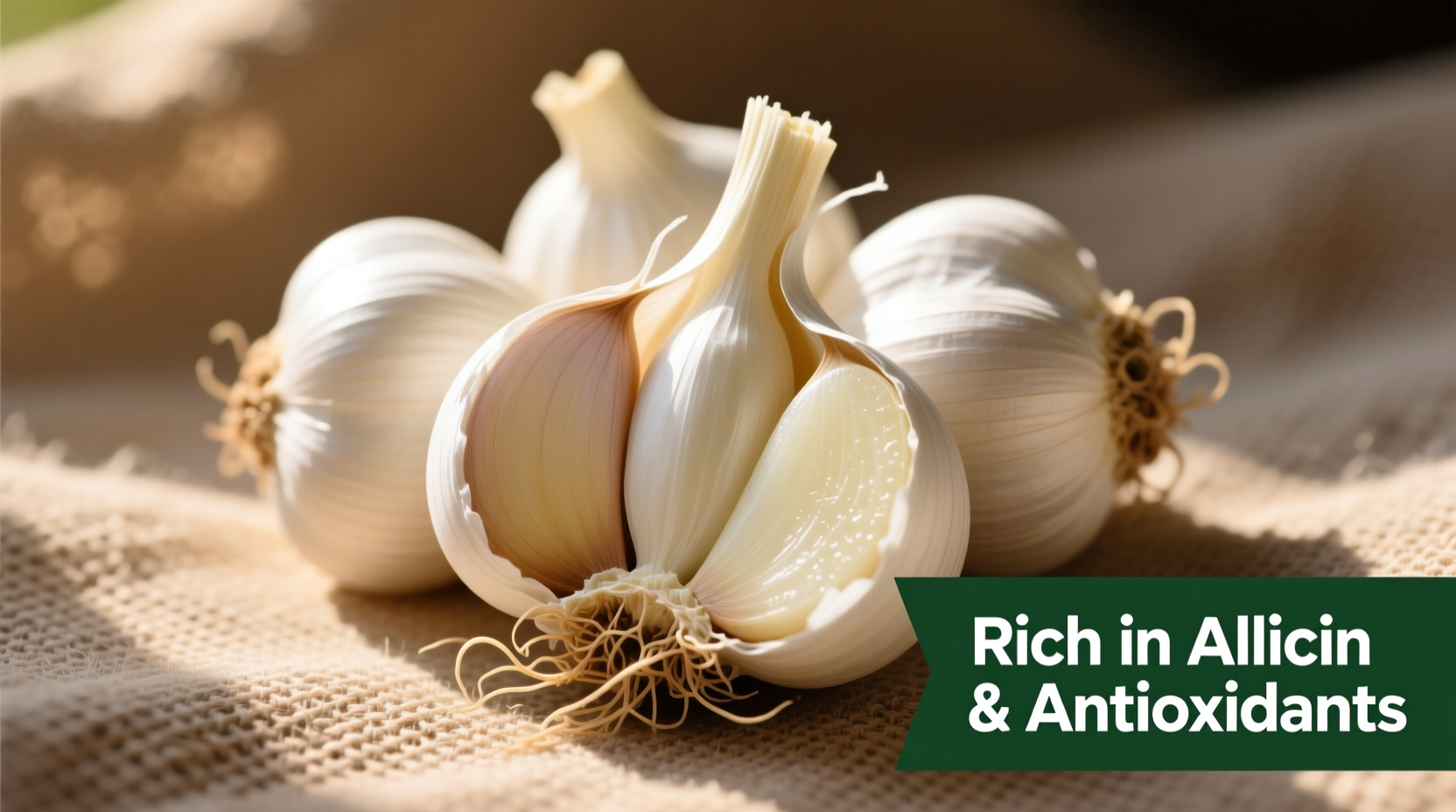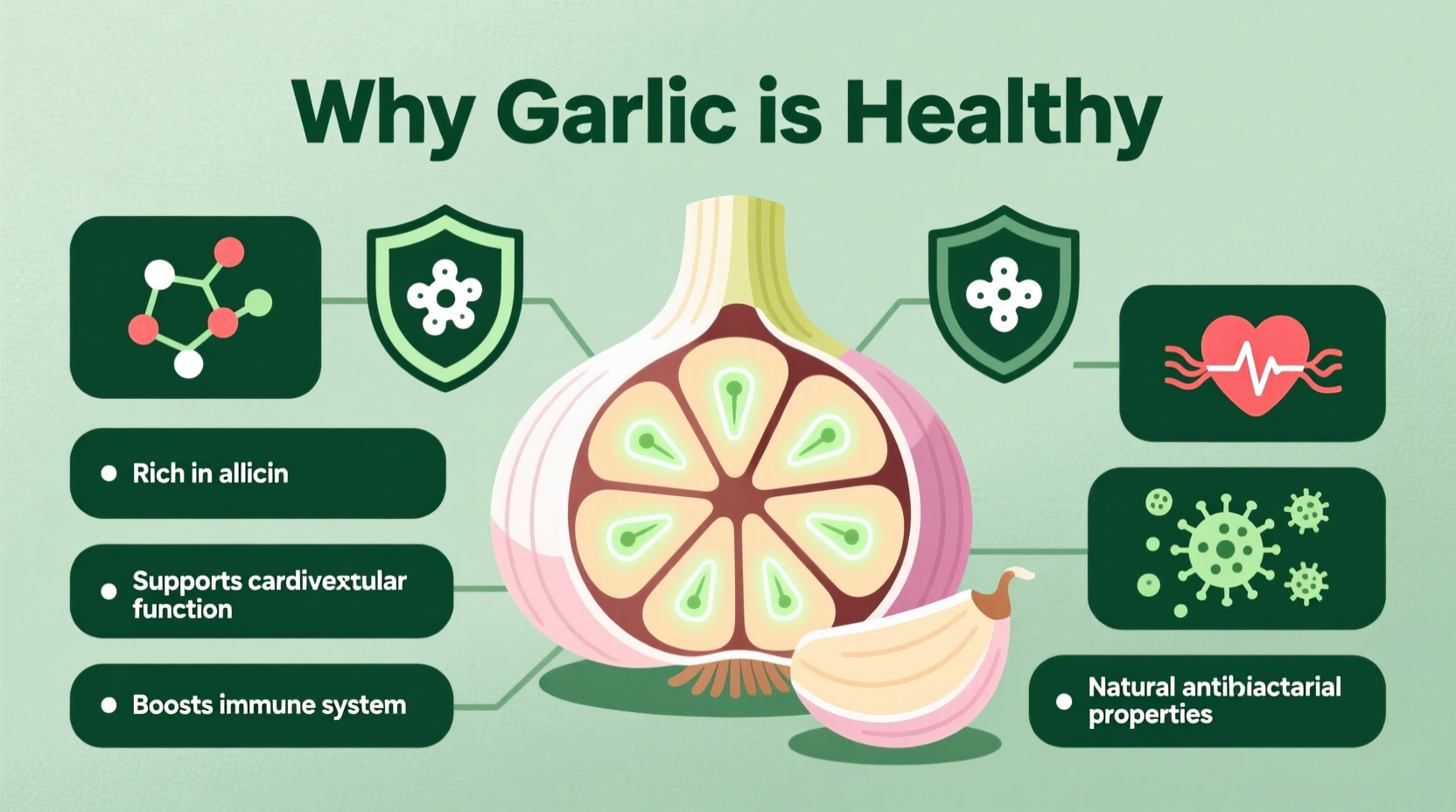For centuries, cultures worldwide have recognized garlic's healing power. Modern science now validates what traditional medicine practitioners understood long ago: this pungent bulb offers remarkable health advantages. Let's explore exactly why garlic deserves its superfood status and how to maximize its benefits.
The Science Behind Garlic's Healing Power
When you crush or chop garlic, an enzyme called alliinase converts alliin into allicin—the compound responsible for most of garlic's health benefits. Allicin's instability means proper preparation matters significantly. Research from the National Center for Complementary and Integrative Health shows that letting crushed garlic sit for 10 minutes before cooking preserves up to 60% more allicin.

Garlic's Proven Health Benefits
Multiple clinical studies confirm garlic's therapeutic effects:
Cardiovascular Protection
A comprehensive American Heart Association review found garlic supplementation reduced systolic blood pressure by 5-10 mmHg in hypertensive individuals. The sulfur compounds in garlic promote vasodilation, improving blood flow and reducing arterial stiffness.
Cholesterol Management
Research published in the Journal of Nutrition demonstrated that aged garlic extract reduced total cholesterol by 7-12% and LDL cholesterol by 10-15% in participants with elevated levels. The compounds allicin and ajoene appear to inhibit cholesterol synthesis in the liver.
Immune System Support
A randomized controlled trial tracking 146 participants over 12 weeks found those taking garlic supplements experienced 63% fewer colds than the placebo group. Garlic's antimicrobial properties help combat bacterial, viral, and fungal infections.
| Health Benefit | Scientific Evidence | Recommended Intake |
|---|---|---|
| Blood pressure reduction | 5-10 mmHg decrease in systolic BP | 1-2 cloves daily (raw or aged) |
| Cholesterol improvement | 7-12% total cholesterol reduction | 600-1,200 mg aged garlic extract |
| Immune support | 63% fewer colds in clinical trials | 1 clove raw garlic daily |
| Antioxidant protection | Increased antioxidant enzyme activity | Regular culinary use |
Garlic Through the Ages: A Timeline of Medicinal Use
Understanding garlic's historical context reveals why modern science continues investigating this remarkable plant:
- 3000 BCE: Ancient Egyptians documented garlic's medicinal uses in the Ebers Papyrus, prescribing it for 22 different conditions
- 500 BCE: Greek physician Hippocrates recommended garlic for respiratory problems, parasites, and poor digestion
- 1800s: During cholera epidemics, garlic was widely used as an antimicrobial agent before antibiotics existed
- 1944: Scientists first isolated allicin, identifying garlic's primary bioactive compound
- 1990s-Present: Modern clinical trials validate garlic's cardiovascular and immune benefits
Maximizing Garlic's Health Benefits: Practical Guidelines
How you prepare and consume garlic dramatically affects its therapeutic properties:
Optimal Preparation Methods
Crushing or chopping garlic and waiting 10 minutes before heating allows maximum allicin formation. Cooking immediately after cutting destroys the alliinase enzyme before it can create beneficial compounds. For immune support, consume raw garlic; for cardiovascular benefits, aged garlic extract provides consistent dosing.
Recommended Daily Intake
Most studies showing significant health benefits used:
- 1-2 raw cloves daily for immune support
- 600-1,200 mg of aged garlic extract for cardiovascular benefits
- Regular culinary use (at least ½ clove daily) for general health
Important Considerations and Limitations
While garlic offers impressive health benefits, certain considerations affect its suitability:
| Situation | Recommendation | Scientific Basis |
|---|---|---|
| Before surgery | Avoid high doses 7-10 days pre-surgery | Garlic may increase bleeding risk (NIH) |
| On blood thinners | Consult physician before high intake | Potential interaction with anticoagulants |
| Acid reflux | May trigger symptoms in sensitive individuals | Garlic relaxes lower esophageal sphincter |
| Pregnancy | Culinary amounts safe; avoid high-dose supplements | Limited research on high supplemental doses |
Garlic in Your Daily Routine: Simple Implementation Strategies
Incorporating garlic's health benefits into your lifestyle doesn't require drastic changes:
- Add crushed raw garlic to salad dressings or hummus for immune support
- Include 1-2 cloves in cooked dishes for general health benefits
- Consider aged garlic extract supplements if you dislike garlic's taste or smell
- Pair garlic with lemon and olive oil for enhanced absorption of beneficial compounds
Remember that consistency matters more than quantity. Regular moderate consumption provides more sustained benefits than occasional large doses. The key scientific benefits of eating garlic daily include improved cardiovascular markers, enhanced immune function, and increased antioxidant protection.
Conclusion: Harnessing Garlic's Natural Healing Power
Garlic's impressive health profile makes it one of nature's most powerful functional foods. By understanding how to properly prepare and consume garlic, you can maximize its cardiovascular, immune, and antioxidant benefits. While not a miracle cure, regular garlic consumption represents a simple, evidence-based strategy for supporting long-term health and wellness.











 浙公网安备
33010002000092号
浙公网安备
33010002000092号 浙B2-20120091-4
浙B2-20120091-4